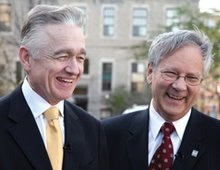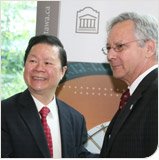 THE ACT AND HUMAN RIGHTS VERSUS REALITY
THE ACT AND HUMAN RIGHTS VERSUS REALITYThe
University of Ottawa Act 1965 states that “The objects and purposes of the University are, to promote the advancement of learning and the dissemination of knowledge … in accordance with Christian principles … and to promote the betterment of society …”
It is of interest to compare these legal and moral obligations to actual decisions made by the University’s Executive. In some cases the obligations of the Act are augmented by explicit requirements of the
Ontario Human Rights Code.
Let us take the recent example of a denial of access to the Deaf community that was reported in the media
HERE (in English) and
HERE (in French).
The event in question is a weekly documentary film and discussion series organized and moderated by physics professor Denis Rancourt that has operated continuously during the academic year since September 2005. (See schedules posted
HERE and
HERE.)
THE FILM SERIES IS A UNIVERSITY-SPONSORED EVENTThe campus auditoriums for the film and discussion series and the projection equipment have always been provided by the University, free of charge, including for the present winter 2008 season. Outside groups and official student clubs and associations, by comparison and without exception, must all pay significant fees to reserve rooms and use the projection equipment for non-University-sponsored events (e.g.,
HERE).
The film and discussion series has always been part of professor Rancourt’s yearly reports and has always been part of his official workload, under the universally recognized and established work category “community service”. Rancourt’s yearly reports have always been approved, in all his years at the University since 1987.
The valid work categories for professors include: research, teaching, administration, and community service.
Academic freedom, which is protected by law, gives professors the right to freely choose which research and community service they do. For examples of sponsored research and community service activities see Rancourt’s official university web page:
http://www.science.uottawa.ca/~dgr/.
Professors are entitled to request redistributions of their work among the different work categories. In winter 2006 Rancourt asked that his significant involvement with the film and discussion series be considered in possibly reducing his formal teaching duties. See the text of his application
HERE.
All such requests, every year, follow strict procedures enforced by the
Collective Agreement between the University and the professors’ union. Following established procedures in his department (the Physics Department, in the Faculty of Science), therefore, Rancourt’s request was first studied by the Departmental Teaching Personnel Committee (DTPC). Formal minutes record all DTPC meetings; that are chaired by the chairperson of the department. The chairperson forwards the DTPC recommendations to the dean of the faculty and adds the chairperson’s own recommendations. Then the dean makes the final decision about the professor’s workload for the upcoming academic year, without interference from the upper administration.
All usual records show that the required process was followed in winter 2006. Rancourt’s request to have a reduced formal teaching load was denied. The dean of the time, Christian Detellier, later confirmed in writing that, nonetheless, the film and discussion series remained part of Rancourt’s official workload under “community service”. See Detellier’s letter
HERE.
Given the above described record and established and binding administrative procedures, there can be no doubt that the film and discussion series was and is an integral part of Rancourt’s official university workload and that it is a University-sponsored event, paid for and organized by the University, on its campus.
DEAN AND PRESIDENT CANNOT REDEFINE WHAT IS AND IS NOTThe Dean cannot unilaterally decide on a whim to suddenly change a professor’s workload, except under special resource-management emergency conditions and following special procedures. Likewise, a member of the upper executive, such as the President of the University, cannot intervene in defining a professor’s workload. (See
Collective Agreement, section 22.)
Yet as early as 2007 the new dean of the Faculty of Science,
André Lalonde, instructed the University computer services director that Rancourt should not be given electronic listserve messaging services for the film series because the dean did not consider the series to be a valid Faculty of Science offering. This type of petty in-fighting was only a precursor of what was to come.
When member of the Deaf community Genevieve Deguire asked the
Access Service of the University for access (i.e., sign language interpretation services) to attend the film and discussion series she could not have expected the degree of resistance that she was to experience.
The university Access Service office directed Deguire to ask the professor in charge (Rancourt) to secure a memo from his dean that the series was indeed a Faculty-sponsored event. The Dean refused and it was claimed in writing that the film and discussion series was not part of Rancourt’s workload. Access Service is under the Student Academic Success Service (
SASS). The director of SASS of the time, Serge Blais, sided with dean Lalonde in denying access, despite Rancourt’s clear explanations of the situation. See exchanges of emails
HERE.
Deguire wrote to President Gilles Patry to ask that he repair the situation and provide access. Patry refused, citing Blais’ decision letter. See exchanges
HERE.
At about this time the Access Service office booked a sign language interpreter by “mistake,” as they normally would have done without the dean’s negative response. As a result, Deguire and another member of the deaf community enjoyed one film and discussion event that was a great success. This confirmed to those in attendance that deaf community access was a benefit to all, including the hearing community.
Deguire therefore wrote the president a second time asking him to reconsider his decision. The President refused again. See exchanges
HERE.
When the university called a
December 2007 town hall meeting with its executive, Deguire asked to attend and was provided access to the meeting. At that town hall meeting Patry publicly stated that access to the film series would not be granted because the series was sponsored by a separate organization and was not affiliated with the University. He stated as “proof” that if an auditorium had not been available for the series then it could have been given off campus.
DEGUIRE GOES PUBLIC AND THE UNIVERSITY SPELLS IT OUTDeguire held a well organized press conference on January 14, 2008, with virtually every major Deaf community association present in support, and with two sign language interpreters on hand, provided by Deaf community associations. The press conference was held in the lobby of the campus building (MacDonald Hall) where the film series has most often been hosted. Deguire filed
THIS Ontario Human Rights Commission complaint.
The University made its position public. It put out
THIS press advisory stating that the film and discussion series “is in no way related to any academic or other activity at the University of Ottawa.” Someone should inform the many professors who regularly attend and who recommend it to their students…
University Legal Counsel, Michelle Flaherty, is quoted by the media as stating that the film and discussion series, that has recently called itself the Ottawa Cinema Politica (OCP) series, is sponsored by Cinema Politica. That it is therefore not a University-sponsored community service and that, therefore, the University has no human rights legal obligation to provide access.
The university position, in the opinion of UofOWatch, is more tenuous than if it were to say, for example, that the U of O business school calls itself the
Telfer School of Management and the university has received $25 million from Telfer towards the school’s new building so the university has no liability insurance responsibilities towards students of the school.
Cinema Politica is a shoestring-budget student network that started at Concordia University in Montreal and that provides a web site for promotion of film events put on by its independent name-affiliated members. It makes itself available as a free resource to organizers, including university professors, and it mostly serves university venues.
The University’s position is ludicrous and appears to be a device intended to deny access. The university pays for the auditorium, the projection equipment, the insurance coverage, security, after-hours auditorium wheelchair access via a lift operated by security personnel, and Rancourt’s salary. The university has given continuous public access to the weekly academic-year event since September 2005 and has never required that an external fee be paid by anyone.
To use such a device to deflect a modest request for access to a valued community educational experience is, in the opinion of UofOWatch, a violation of the historic principles guiding public academic institutions in Canada. This from a public institution that in the last fiscal year had a surplus of $67 million dollars and in the last year or so has received “no-strings-attached” private gifts of over $40 million dollars.
In the opinion of UofOWatch, if this is not the result of gross institutional incompetence, then it points to malfeasance of office by several University executives and their professional agents, including the president.The University’s decision to deny access is contrary to “promot(ing) the betterment of society” “in accordance with Christian principles.” (
University of Ottawa Act, 1965) Something is amiss.
.
***
.[Note-1: “In the opinion of UofOWatch” means “In the opinion of its editor and manager Professor Denis G. Rancourt”, as always in this blog.]
[Note-2: Interestingly, the University formally admits that this UofOWatch blog is part of Rancourt’s official university workload, since it is using labour law and internal discipline to attempt censorship, yet it has now arbitrarily declared the OCP film series that it houses and finances as not part of Rancourt’s university workload… How convenient.]
[Photo Credit: The Fulcrum.]










 The Student Federation University of Ottawa (
The Student Federation University of Ottawa ( The SFUO also demands that the U of O administration accept the SFUO’s nomination of Mark Kelly to the
The SFUO also demands that the U of O administration accept the SFUO’s nomination of Mark Kelly to the 






























